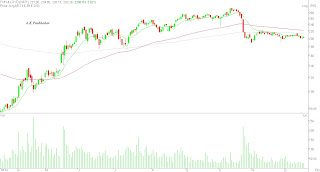China has introduced a high speed train between Wuhan-Guangzhou the world's fastest train journeys at a 350-km-per-hour designed speed, will cover a distance of 1,068.6-kilometer in just more than 3hours previously the distance used to take 10hours.
The average speed of the high-speed railways is 243 km per hour in Japan, 232 km per hour in Germany and 277 km per hour in France. China will build 42 high-speed passengers rail lines with a total length of 13,000 kilometers in the next three years, covering more than 90% of the population.
The record for the highest speed sections is held by the most prestigious 2001 - Bhopal Shatabdi which covers the Mathura–New Delhi section (141 km) in 1 hour—an average speed of 140 km/h.
Indian rail network covers a total length of 63,140 kilometers and 4th largest railway network in the world transporting over 6 billion passengers and over 350 million tonnes of freight annually.
Indian Goods train average speed is around 24km/PH http://www.irfca.org/docs/stats/stats-goods-trains.html http://www.business-standard.com/india/news/-rails-justsnail/364005/ India's cargo trains run at 19-30 km an hour, they run at 120 km in China - and the difference is only growing.
http://en.wikipedia.org/wiki/High-speed_rail%20High%20speed train across the world, when will India see such high speed train.
- India has a population of 115crs and if this population has to move around we need faster and efficient railways system. But what we have today is slow, inefficient and a system which can carry 35% of people who wish to travel and which strains our Road transport system and many postpone their travel. Recently Mumbai announced that any new building above 8 floors won’t be given water connection which implies the strain on Indian metro and HCC has come with a project in Lavasa http://www.lavasa.com/high/files/Lavasa_EBrochure.pdf which can decongest metro and if India has to grow we need to maintain balance between metro and develop 2nd and 3rd tier cities in a big way and interconnect all major town and cities and make travelling hassle free. Today for next one month I don’t get a booking for railways even if I try highest 1st class A/c which indicates frequency of trains is too less compared to the population which is to be handled.
- Urbanization in India is growing rapidly and cities are spreading very fast towards nearby small towns also which are making real estate bubbles a big problem to handle. Cost of living is going through the roof as we fight with 19% food inflation growth which is quite alarming for such a huge population base.
- If we have to stop such bubbles from taking shape, people must be able to travel from villages to work in metros and when work is finished they should be able to go to their villages again easily. This will stop urbanization of villages and the farming and other traditional activities of small towns and villages won't be hampered. Slowly we are losing out on agriculture just because we don't have fast means of transport. These days anywhere in India if we have to travel just 500kms it would take out a whole day of the passenger.
- Faster means of transport would reduce pressure on metros as well. If people go back to their villages after work, the population in metros too would be in check. Right now people have to compulsorily shift to metro cities as they don't see any future in traditional agriculture and for attraction of better wages they prefer shifting to metros.
- Today our agriculture or food needs are witnessing supply gap which can be fulfilled if village population swells. Growing metro cities means food security of India is under threat always and already we are facing this.
- China had vision and they have planned many things well, but more than that they are able to accomplish their goals. China has introduces speed trains just to decongest the growing metros, similar thing can happen in India. But our biggest problem has been our democracy which makes vote banks more important than any policy matter, in fact saving vote bank is the only policy matter these days, give some freebies and save our vote bank looks like the only strategy of politicians here. Sitaram Yetchury once said after visting China,"They are behaving like Delhi busses singaling Left but they have turned Right." We are best planners but worst implementers.
- India being the biggest democracy we always compare ourselves with china, maybe one day we will cross the population of China very easily but catching up with their acumen for growth will be very difficult.
- China has a well drawn plan for growth thier policy towards other countries and the bargain power which China wields. I feel we are not doing enough to grow, we are not moving anywhere. Just higher GDP numbers don't say that India is growing, that is paper growth. Real growth comes from growth of the people as a whole and improvement in the way they do their day-to-day things. We don't need to worry about corruption, that is everywhere in higher or lower degree, but with all drawbacks we have to grow. Many smaller countries than India too have better policy-oriented approach than ours, they are far more developed even Pakistan has 55000km of Gas pipeline while we have barely 1/4th of that. We need to move much faster and in a much different way, there is a lot more to be done!












